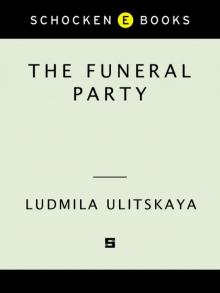- Home
- Ludmila Ulitskaya
Jacob's Ladder
Jacob's Ladder Read online
Begin Reading
Table of Contents
A Note About the Author and Translator
Copyright Page
The author and publisher have provided this e-book to you for your personal use only. You may not make this e-book publicly available in any way. Copyright infringement is against the law. If you believe the copy of this e-book you are reading infringes on the author’s copyright, please notify the publisher at: us.macmillanusa.com/piracy.
The shadows of my world extend beyond the skyline of the page, blue as tomorrow’s morning haze—nor does this terminate the phrase.
—VLADIMIR NABOKOV
1
The Willow Chest
(1975)
The baby boy was lovely from the start. He had a pronounced dimple on his chin and a neatly formed little head, as though fresh from a visit to a good barber. His hair—just like his mother’s—was cropped short, though it was a shade or two lighter. Nora fell in love with him on the spot. She had been uncertain about it before; she was thirty-two years old, and believed she had learned to love people on their own merits, not simply because they were related to her. The baby turned out to be fully deserving of her unconditional love, however. He slept soundly, didn’t bawl, and nursed punctiliously. He examined his own clenched fists in wonder. He didn’t keep to a strict schedule. Sometimes he would sleep for two hours, and sometimes for six hours straight, after which he would wake up and start sucking at the air—and Nora would put him to her breast. She didn’t like schedules either, and she made a mental note that they had this in common.
Her breasts underwent a remarkable transformation. During her pregnancy, they had begun filling out nicely. Before then, they had looked like flat saucers with nipples. Afterward, when her milk began flowing, they made her feel like a preening bird. Nora studied her chest as it blossomed and derived a peculiar satisfaction from the changes. Physiologically speaking, of course, they were somewhat unpleasant—what with the constant heaviness and pressure, and the inconvenience of it all. But nursing itself brought with it a sweet pleasure not directly related to the purpose at hand … It had been three months since the little one had made his entrance into the world, and already they called him Yurik instead of “baby.”
He was installed in the room that had once been considered her mother’s. It had become nobody’s after Amalia Alexandrovna moved for good to Prioksko-Terrasny Nature Reserve, where her new husband, Andrei Ivanovich, worked. Two weeks before Nora went into labor, the room had been hastily whitewashed. When she brought him home, Yurik was snuggled into the white crib that had been a prop for the second act of Three Sisters. By now it was irrelevant, but during the previous theater season the whole troupe had been convulsed by the scandal that erupted when the play was shut down. Nora was the set designer; the director of the play was Tengiz Kuziani.
Before he flew back to Tbilisi, Tengiz vowed never to return to Moscow. A year later, he called Nora to tell her that he had been invited to Barnaul to stage Ostrovsky’s Without a Dowry, and that he was considering the offer. At the end of the conversation, he suggested that she come with him as the set designer. He seemed not to know that Nora had had a baby. Or was he just pretending not to know? That would have been surprising—was it possible that the backstage grapevine had faltered all of a sudden? The theater world was a fetid swamp, where private lives were turned inside out and the most insignificant details were broadcast far and wide. Whoever loved, or failed to love, whom; whoever got tangled up with whom in the bedsheets of provincial hotels while on tour; whichever actress had had to have an abortion because of which actor—it all immediately became common knowledge.
This had no bearing on Nora, however. She was not a star. The only thing that could be said of her was that she had had a serious comedown. And that she now had a baby, of course. The silent question on everyone’s lips was: whose? Everyone knew about her affair with the director. But her absent husband was not part of the theater. He belonged to “the audience”—and she herself was just a young set designer, at the beginning of her career. Which was also, evidently, the end of it. For these reasons, the theater riffraff paid no attention to her. There was no whispering behind her back; there were no covert glances. None of it mattered now, anyway. She had quit the theater.
Yurik was already awake by eight o’clock. Nora was expecting the nurse, Taisia, to arrive at nine, to give him a vaccination. It was past eleven, and she still hadn’t arrived. Nora went to do some laundry, so she didn’t hear the doorbell right away. When she did, she jumped up and ran to open the door. Taisia started babbling even before she stepped inside. She wasn’t simply a nurse from the children’s district polyclinic, but a woman with a mission: to educate foolish young mothers. She imparted to them the age-old secrets of nurturing babies—and, while she was at it, shared with them her pearls of feminine wisdom. She edified them on the subject of the family unit, including how to get along with “mamas-in-law” and the husband’s other relatives, not least his former wives. She was a cheerful gossip, a lively rumormonger, who was certain that without the benefits of her patronage (her official vocation was “Home-Visit Nurse-Patron”) all these little babes would fail to thrive. She did not acknowledge any methods of upbringing but her own, and the mere mention of Dr. Spock shattered her composure.
Nora was the kind of young mother she liked best of all—a single parent, her first child, with no help or support from her own mother. Nora was simply ideal. Because of her postpartum weakness, she needed to rally all her strength merely to survive, and she put up no resistance to Taisia’s science and its applications. Moreover, Nora’s experience in theater, where actors, like little children, were given to endless squabbling and fits of jealousy, had taught her to listen to all kinds of nonsense with polite attention, holding her tongue when necessary, and nodding sympathetically.
Nora stood next to Taisia, absorbing her chatter and watching the snowflakes on the needlelike ends of her fur coat turn into tiny droplets and roll off.
“I’m sorry, I was held up. Can you imagine, I stopped by the Sivkovs’—you know, Natasha Sivkov, in apartment fifteen? Her little Olya, eight months old, is just precious; she’ll make a good match for your little fellow. I walked in right in the middle of a family quarrel. The mother-in-law, who had just arrived from Karaganda, claimed that Natasha wasn’t taking proper care of her precious son, and that the baby had developed allergies on account of poor nourishment. Well, you know me—I gave her a piece of my mind and set things to rights.”
While she was washing her hands in the bathroom, Taisia chided Nora: “How many times do I have to tell you—use children’s soap for washing clothes! That washing powder is no good. I’m not just making it up…”
Yurik had gone back to sleep, and Nora didn’t want to wake him up just yet. She offered Taisia some tea. Taisia settled down at the head of the table in the tiny kitchen. It was a fitting place for her. She had an imposing head, with loose curls gathered up in a clawlike hair clip, and the space she occupied seemed to organize itself around her deferentially—the teacups and saucers arrayed themselves like a flock of sheep around a shepherd. Nice composition, Nora noted to herself.
Nora placed on the table a box of chocolates sporting a picture of a flying deer. Guests sometimes brought them to her, but Nora was indifferent to sweets. The supply of chocolates piled up, waiting for their chance to be eaten, meanwhile growing a thin white veneer.
Inadvertently spraying droplets from her hair around the tabletop, Taisia reached out her hand to pluck the confection of her choice from the expensive box of sweets. Suddenly, her hand still hovering in midair, she said, “Hey, Nora, are you even married?”
She’s inducting me into the secrets
of baby care, and now she wants my secrets. In exchange for her tip on children’s soap, Nora thought. Tengiz had taught her to analyze dialogues between characters, to grasp their internal workings, in just this way.
“Yes, I’m married.”
Don’t divulge too much; you might spoil everything. The dialogue has to unfold, it has to suggest itself.
“A long time?”
“Fourteen years. Since graduating from high school.”
A pause. It was falling into place nicely.
“Then how come you’re always alone when I come over? He never helps out, and you always come to clinic appointments by yourself.”
Nora stopped to think for a moment. Should she say that he was a ship captain, off sailing the seven seas? Or that he was doing time?
“He comes and goes. He lives with his mother. He’s an unusual person, very talented, a mathematician. But as for survival skills in life, he’s about on a par with Yurik.” Nora told the truth—about a tenth of it.
“Oh, I know of another case just like yours!” Taisia said, animated.
Just then Nora’s keen ear picked up a slight noise, and she went to check on the little one. He woke up and looked at his mother as though in surprise. Taisia was standing right behind her, and he stared at her.
“Yurik, sweetie, have we woken up?” Taisia said in melting tones.
Nora picked up her son. He turned his head toward the nurse, watching her expectantly.
Nora didn’t have a diaper-changing table. She used an old-fashioned desk with a folding top, which Yurik was already outgrowing. And Nora didn’t put him in regular diapers. She had two special romper suits made for him at a sewing-and-alterations workshop, where the seamstresses had “overhauled” some foreign model. Taisia grumbled about the capitalist underpants lined with rubber that chafed his little rumples of fat when they were wet. Then she kissed the baby on his bottom and ordered Nora to spread a clean sheet on the divan while she got the vaccination ready.
She mixed something from one vial with another, drew the liquid up into a syringe, and jabbed him gently with the needle. The baby screwed up his face and was about to bawl, but then changed his mind. He looked at his mother and smiled.
What a smart little fellow; he understands just what’s going on, Nora thought in delight.
Taisia went out to dispose of the cotton wad. From the doorway, she bellowed, “Water! Nora, the bath is running over! It’s a flood!”
The bathtub had indeed overflowed, and water was streaming down the hallway, reaching nearly to the kitchen. They plumped Yurik down in his crib, evidently in too much haste, and he started to cry. Nora turned off the tap, threw a towel down on the floor, and began sopping up the water. Taisia helped her with dexterous alacrity. Just then, amid the howls of the child abandoned in the crib, the telephone rang.
It’s the neighbors; their ceiling is already leaking, Nora thought, and ran to pick up the phone to tell them it was all under control.
But it wasn’t the neighbors. It was Nora’s father, Genrikh.
Bad timing, as usual, Nora just had time to think. Yurik had set up an indignant wail for the first time in his life at full volume, and water was no doubt already gushing down into the neighbors’ apartment …
“Dad, the apartment’s flooded, I’ll call you back.”
“Nora, Mama passed away,” he said, with slow, decorous solemnity. “Last night … at home…” Then he added, without any trace of solemnity, “Hurry over, please, as fast as you can! I don’t know what to do.”
Nora, barefoot, flung the still-dripping towel onto the floor. Again, bad timing. Why did her relatives always choose the most inconvenient moment even to die?
Taisia grasped the situation in an instant.
“Who?”
“Grandmother.”
“How old?”
“Over eighty, I should think. She lied about her age her whole life. She even managed to change it on her ID. Will you take over for a few hours while I’m gone?”
“You go ahead. I’ll stay here.”
Nora went to wash her hands again, quite unnecessarily, after the flood. Then she rushed over to Yurik and gave him her breast. At first he refused the nipple haughtily, but Nora coaxed him by putting it to his lips. Then he began to suck and gulp, and went quiet.
Meanwhile, Taisia had stripped off her skirt and blouse. She deftly sopped up the water and emptied it into a bucket, and afterward dumped it into the toilet down the hall. Her pink slip and short white cotton camisole, and thick streams of hair that had escaped from the clasp, flashed into view at the end of the murky hallway. Nora couldn’t suppress a smile at her agility, her beauty, and the precision of her movements.
“I don’t know how long I’ll be gone. I’ll call you. She lives nearby, on Povarskaya Street.”
“Go on—I’ll call off my next two visits. But express some milk, just in case. You might be a long time. When things like this happen…”
Well, what do you know, Nora thought. You’ve only seen her a few times in your life, but she jumps right in, at a moment’s notice, when you need her. What a godsend!
Ten minutes later, Nora was rushing down the boulevard. She turned the corner at the Nikitsky Gates, and in another ten minutes was ringing the doorbell of a communal apartment under which hung a small copper plate with the inscription “The Ossetskys.” The names of the other seven families were written on plain cardboard.
Her father, the chewed-up end of his now extinguished cigarette dangling from his lips, gave her a weak embrace, and began to cry. Curbing his emotions, he said: “Can you believe it? I called up Neiman to tell him Mama had died, and it turns out that he’s dead, too! I already have the death certificate from the doctor, and now I need some other paper from the polyclinic. And we have to decide where to bury her. Mama said it’s all the same to her, as long as it’s not next to Jacob.”
All this he told Nora as they were walking down the long corridor. A fat neighbor, Grandmother’s enemy Kolokoltsev, poked his head out the door of one room, and the squat Raisa looked out of another. Walking toward them down the corridor was Katya “Firstonehere” (as she had baptized herself). Her mother had lived here as a servant since the building was new. Katya was born in the little room off the kitchen. She knew everything about everyone, and to this day wrote ungrammatical, barely legible letters denouncing the other residents—which was no secret to any of them. In fact, she was so artless and ingenuous that she had warned them all beforehand, “Watch out, I’ll rat on all of you!”
Grandmother’s dusty room reeked of tobacco—Nora’s father had been smoking there—and of the eau de cologne her grandmother had sprayed around her with an atomizer her entire life. This procedure took the place of tidying up. Now she lay on the rustic, hand-built divan in her white nightgown, its oft-mended collar covered with a maze of tiny stitches. She looked small, her head thrown back proudly, her eyes not completely shut. Her jaw was slack, her mouth hung open slightly, and the shadow of a smile hovered on her face.
Nora’s throat constricted in pity. She looked around her and saw the bitter dignity of her grandmother’s life. Poverty by choice. Bare windows. Curtains, according to her grandmother, were a petit-bourgeois affectation. The enfilade doorways on either side of the room, no longer functional, were blocked with a bookcase on one wall and a buffet on the other. There was as much dust in the bookcase as there were books. Since childhood, Nora’s allergies had always kicked in when she spent the night here—during those years when she still called her grandmother Purr-Purr and adored her with passionate, childlike intensity. Every single book was familiar to her. They had been read and reread, over and over again. To this day, Nora battled all forms of ignorance with the weapon of culture, and culture in its entirety originated for her in these several hundred tomes, pored over like books on a desert island, their margins swarming with tiny pencil marks and notations. From the Bible to Freud. Well, the island was not exactly deserted. It was de
nsely inhabited: flocks of bedbugs grazed in these parts. They had feasted on Nora in childhood, but Grandmother hardly noticed them. Or maybe they had hardly noticed her?
The remnants of a decorative coverlet hung in front of the entryway. It had never been laundered or dry-cleaned since the day it had arrived. A bare incandescent lightbulb—“Lenin’s Lamp,” as it was called back in the day—dangled from the ceiling. And Grandmother had read him—earnestly and fearfully. Indeed, she was personally acquainted with Lenin’s widow, Krupskaya, and People’s Commissar of Education Lunacharsky. She had engaged in cultural work—she had once mentioned something about founding a drama studio for homeless children … What a strange, unlikely world, in which Karl Marx and Sigmund Freud, Stanislavsky and Evreinov, Andrei Bely and Nikolai Ostrovsky, Rachmaninoff and Grieg, Ibsen and Chekhov, went hand in hand. And, of course, her beloved Hamsun. The starving journalist who had already begun gnawing at his leather shoelaces, and saw lovely visions while hallucinating from hunger, until he was struck by an astonishing idea: why not go out and find work? And he hired himself out as a ship’s boy.
Grandmother had practiced some form of esoteric dancing, then the forgotten and maligned science of pedology, and in her later years referred to herself as an “essayist.” And she lived a spiritual life, as far removed from present-day reality as the Jurassic period. These thoughts washed over Nora like a sudden storm as she stood there, not even taking off her coat, looking at her grandmother, who was gone forever.
How much Nora had learned from her! Grandmother had played on this piano, and Nora had “danced the mood” of the music. Here, on the corner of the table, Nora had drawn a blue horse, much to her grandmother’s delight: it reminded her of Kandinsky’s Blue Rider. They visited the Pushkin Museum together, they went to concerts and plays. How passionately Nora had loved her then—and how cruel Nora had been later, when she grew disillusioned with her and coldly rejected her. Grandmother hated anything that smacked of the bourgeois. She detested philistinism in all its forms, and called herself a “nonpartisan Bolshevik.” Eight years earlier, they had quarreled once and for all—Nora was ashamed to admit it—about politics. How petty and ridiculous …

 Jacob's Ladder
Jacob's Ladder Life Stories
Life Stories The Funeral Party
The Funeral Party Medea and Her Children
Medea and Her Children The Big Green Tent
The Big Green Tent